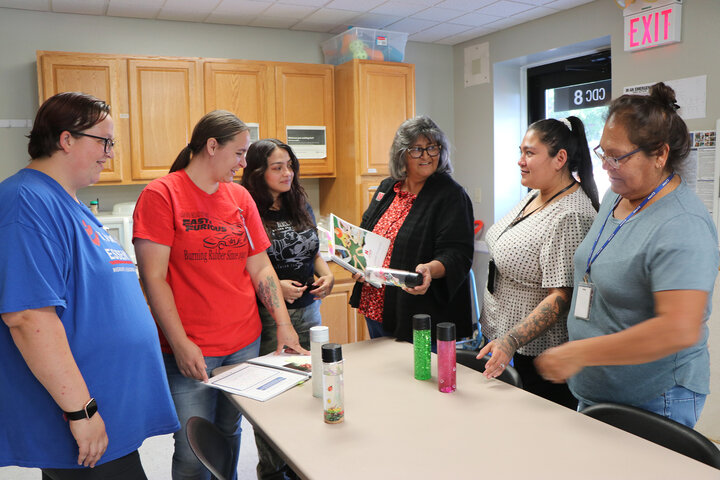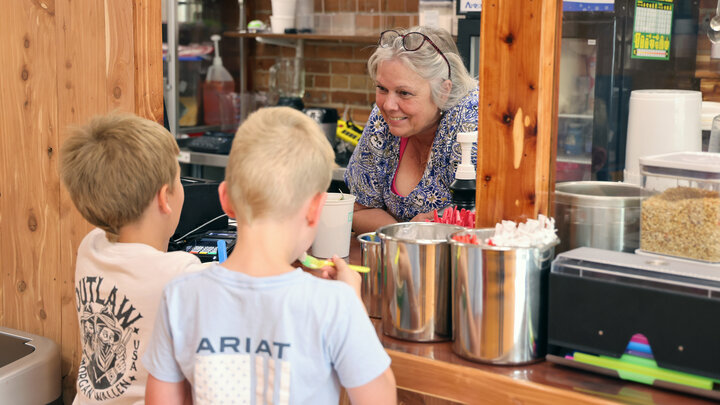Feature stories/news
Local Interest

Beware of false Spring
By David Lott | Nebraska Extension Horticulture Educator
Warmer weather and longer days are starting to show up, giving so many of us hope and excitement for the new growing season. Beware of "False Spring", where the warm days can be followed by cold snaps and potential spring blizzards that will visit the region at some point in March and April. Below are some tips to consider now, and through mid-April on gardening related jobs in our very uncertain weather.
Now is a great time to sharpen lawn mower blades and service mower engines so they are in good working order for the growing season. Do not mow bluegrass or tall fescue lawns until they have broken dormancy and are greening up for the season, usually around mid-April. Remember to keep the mower height at 3 inches for the mowing season and remove no more than 1/3 of the grass in a single mowing, leaving 2/3 of the grass intact to grow back.
Clean and lubricate garden tools that have been in winter storage, removing rust as needed, so they are ready for the gardening season. Do not clean dead plant material and mulch out of flower beds and garden spots. This dead material may look unsightly to some, but it serves as a protective buffer for tender, emerging perennial plants that are starting to peak out from under the layers. This protective layer also serves as a winter home for many beneficial landscape insects. Leave this layer intact until mid-April in Western Nebraska.
Wait to prune rose canes and dead landscape plant stems until mid-April. Early pruning can initiate early, tender plant growth that can be severely damaged or killed during future cold snaps. When pruning landscape plant stems back in mid-April, leave eight inches of dead stem behind for pollinating insects to use as a habitat for the next generation of native bee species as a natural "bee hotel" to improve pollinator insects in landscapes and gardens. New plant growth will "hide" these stems from view. Rose canes can be pruned back in mid-April at a 45-degree angle. Prune dead cane material back to where new growth is present.
For questions about our False Spring, send an email to David Lott at dlott2@unl.edu. interested may register at https://cvent.me/MOo0ka.
For more information, contact your local Nebraska Extension office or visit https://extension.unl.edu/.

ServSafe® Food Protection Manager Certification Training offered in Scottsbluff
Nebraska Extension will host a ServSafe® Food Protection Manager training on Tuesday, February 11, 2026, from 9 a.m. to 6 p.m. at the Panhandle Research, Extension & Education Center in Scottsbluff. This one-day training helps food service managers, owners, supervisors, and other key staff strengthen food safety practices and meet certification expectations for restaurants, food trucks, and other food establishments.
“Don’t miss this opportunity to enhance your food safety knowledge and meet Nebraska restaurant certification expectations,” said Ashley Fenning, Nebraska Extension. “ServSafe training helps food establishments build confidence, protect customers, and support consistent, safe operations.”
The ServSafe Food Protection Manager course is a nationally recognized program designed to reduce the risk of foodborne illness and improve safe food handling practices in professional foodservice settings. Participants will learn best practices for preventing contamination, maintaining proper time and temperature controls, supporting employee health and hygiene, and creating safe systems for cleaning, sanitizing, and storage. The training also prepares participants to successfully complete the proctored ServSafe Food Protection Manager Certification Exam.
Nebraska has updated food safety provisions through recent legislative action, including updates aligned with the FDA Food Code through the Nebraska Pure Food Act (LB245, 2025), reinforcing the importance of trained leadership within food establishments.
Register online at: https://go.unl.edu/panhandleservsafe2026 or call the Morrill County Extension Office at 308-262-1022 and ask for Ashley Fenning. Training cost is $160 per participant and can be paid on the day of the class. Make checks payable to: University of Nebraska–Lincoln.
For more information, contact Ashley Fenning at the Morrill County Extension, call 308-262-1022, or email astevens4@unl.edu.
ServSafe Food Manager courses offered in 2026 for the Panhandle include:
- March 24 - from 9 a.m. to 6 p.m. at the Cheyenne County Fairgrounds in Sidney
- July 9 - from 9 a.m. to 6 p.m. at the Prairie Winds Community Center in Bridgeport
- October 6 - from 9 a.m. to 6 p.m. at the Box Butte County Extension Office in Alliance
- November 3 - from 8 a.m. to 4 p.m. at the Panhandle Research, Extension & Education Center in Scottsbluff
Register online at: https://go.unl.edu/panhandleservsafe2026 for all classes.

Drought outlook and risk management webinar offered for Nebraska ag producers
Nebraska Extension
The Nebraska Extension will offer a webinar on the drought outlook and risk management for ag producers on March 2. The webinar, “Drought Outlook 2026: Weather, Water and Risk Management,” will be held at noon CT, hosted by the University of Nebraska–Lincoln’s Center for Agricultural Profitability and Nebraska Extension.
It will bring together climate, water, and agricultural economics experts from Nebraska Extension to help producers make informed decisions as they head into spring.
The webinar will look at expectations for spring rainfall and discuss snowpack levels in the North Platte River Basin and what they signal for irrigation supplies in western Nebraska. There will also be an outline of insurance considerations producers may want to review in a dry year.
The discussion will cover irrigation preparation and management strategies as producers assess water availability and plan for the season ahead.
Recent years have underscored how quickly weather conditions can shift. Organizers say understanding the connections between precipitation forecasts, basin snowpack, and crop insurance decisions can help producers better manage risk and position their operations for the year ahead.
Registration is free at https://go.unl.edu/me82.

Nebraska Extension early childhood educator passionate about building strong families
By Chabella Guzman, PREEC Communications
Many Nebraska Extension educators are called to their positions. Jackie Guzman is no exception. She is the Nebraska Extension early childhood educator and lead educator in the Nebraska Extension Engagement Zone 1, located at the University of Nebraska-Lincoln Panhandle Research Extension and Education Center in Scottsbluff.
“It is a purpose, a calling for me. This is where we need to start with parents and children to build a solid foundation, where the children are ready to learn and more apt to graduate,” she said.
Among the programs Guzman provides to professionals is the CHIME (Cultivating Healthy Intentional Mindful Educators) program. It is an eight-week program that focuses on the person working with young children, providing them with the skills to work effectively with children by first helping themselves through mindfulness.
Guzman has developed and implemented programs for non-traditional audiences while incorporating traditional 4-H curriculum and methodologies for youth. One such program is embryology, which includes Extension 4-H educators. “I provide incubators, and the farmers provide eggs. There is a curriculum with activities for elementary school children and early childhood/preschool programs,” she said.



